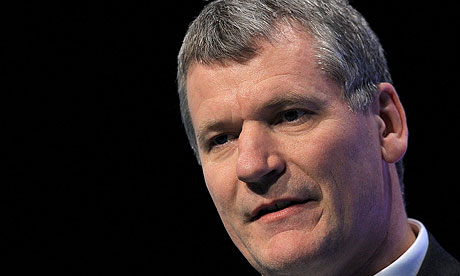
The Manchester United chief executive, David Gill, has said that his club are not about to follow Liverpool into financial meltdown, despite revealing record annual losses of £83.6m which are liable to intensify supporters' protests against the American owners, the Glazer family.
United's losses, which are largely a result of interest payments on a £521.7m debt and one-off charges relating to January's controversial bond issue, were seized upon by supporters' groups as evidence that the Glazers' ownership is undermining the club. But Gill argued that the club's results, which also showed a rise in operating profits to £100.8m, on record turnover, were "very good" and proved that United could cover their £40.2m interest payments while growing and succeeding on the pitch.
Gill said there was £165m in the club's bank account, a figure inflated by last year's sale of Cristiano Ronaldo to Real Madrid for £80m, and that the business was generating enough money to service the debt while investing in the squad.
"We are not a club that needs to sell," he said. "We have money in the bank so there is zero pressure on that, no pressure at all to sell any star player whether it is Wayne Rooney or X, Y or Z. I can categorically say that. The philosophy is to retain and attract the best players. We have £165m in the bank but in some ways we would prefer to have £80m in the bank and Ronaldo on the pitch. "
Some had expected the Glazers to raid that account for up to £95m in order to pay down the £225m in high-interest "payment in kind" loans that are secured on their shareholding and are accruing at a rate of 16.25%. The bond issue allows for the Glazers to siphon off to their parent company, in the first year, up to £127m, which could then be used to pay down the expensive loans. The facility was untouched as at 30 June this year. "They have retained that money in the bank and it's there for Sir Alex if he needs it for players, and for investing in the training ground and the stadium," Gill said.
Broadcasting revenues rose by 5.1% under new Uefa and Premier League deals and commercial revenues were up 16.5%, partly as a result of an aggressive drive to grow overseas sponsorship income. But critics argue that the £460m that has been paid in interest and fees since the Glazers arrived could have been invested in the squad and in keeping ticket prices down.
The chief executive of the Manchester United Supporters Trust, Duncan Drasdo, said the anger that provoked last season's green and gold protest movement had not gone away. It is understood that the group of between 30 and 40 rich fans known as the Red Knights, who raised more than £1bn but were forced to abandon a takeover bid in the face of the Glazers' refusal to sell, have been encouraged by the results and this week's events at Liverpool and remain hopeful that the Glazers will be forced to lower their valuation.
Drasdo said: "Ostensibly we are the best-run football club in the UK for the last 20 years, generating amazing revenue, but the problem is that under the current ownership that's all being wasted because it's going into paying interest on debt. We could be competing with Man City and Chelsea for the best players. Instead of squeezing spend on players and pushing up ticket prices we could be giving supporters who are being priced out, those that have supported the club for many years, the opportunity to watch their team. All of this is because one family decided they wanted to own our football club."
Drasdo said that he believed the increased competition to stay in the top four might eventually tell on Manchester United, as it has on Liverpool. But Gill attempted to reassure fans after this week's events at Anfield. "I can't speak for any other club but the United fans should not be concerned, we have a long-term financing structure in place, excellent revenues that are growing, we are controlling our costs – total wages are 46% of turnover – and we can afford the interest on our long-term finance," he said.
In total, the results show £47m in charges relating to the bond issue. That will be seized upon as the most concrete example yet of money that could have been invested in the team or keeping ticket prices down. Other one-off charges that have been swallowed in this set of accounts include a £19.2m hit on foreign exchange differences relating to the bond issue and a "goodwill" charge of £35.2m relating to the original takeover. Gill argued that if those paper losses and depreciation were ignored, United would have an actual cash profit of £25m.

